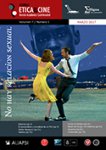Aquarius’ declaration
DOI:
https://doi.org/10.31056/2250.5415.v7.n1.19724Keywords:
Commodification, Singularity, Social Class, Gender, Otherness, Health-disease-care processAbstract
This essay seeks to share discussions, contradictions and questions that the film Aquarius produced on us, on the basis of our backgrounds and experiences as workers of the public health system. From an interdisciplinary construction, we reflect on themes and concepts such as gender, social class, ethnicity, race, identity/ otherness, epochal logics and forms of subjectivities, gentrification. The result was the raising of different questions and interpretations of the stories that intersect in a complex plot from the figure of Clara, the main character. We use three levels of analysis, linked with one another and organized in a hierarchy: a macro-level, linked with the commercial logic and the mode of production; another one, referred to social relationships (institutional); and, finally, that of everyday life (particularization of the generic-social, embodied in the account of situations from the film). The challenge was to problematize obvious readings and thence to question our own mandates around the feminine and women. We propose on this path, a little rambling and confused, to retrieve scenes, dialogues, characters, that we link -direct or indirectly- with social, urban, subjective issues which are representative of phenomena existing and extended in areas of our intervention and training, from a perspective oriented to a critical analysis of the differential health- disease- care process. From a tension between commercial logic- logic of the singular, we consider some of the questions that organize our thinking: How is it possible to resist the prevailing commercial logic? What is the sense of doing it in solitude? What happens with the difficulty to build collective horizons? What is it Clara faces?References
Augé, M. (2000 [1992]). Los «No Lugares». Espacios del anonimato. Una antropología de la Sobremodernidad. Gedisa, Barcelona.
Blanco, J. y Apaolaza, R. (2016). “Políticas y geografías del desplazamiento: Contextos y usos conceptuales para el debate sobre gentrificación”. En Revista INVI, 31 (88), 73-98. https://dx.doi.org/10.4067/S0718-83.
Bomfim, L. A. (2014). Juventude negra no Nordeste do Brasil: Violência, Racismo Institucional e Proteção Social. Saúde da População Negra no Brasil.
Breihl, J. (2009).“Introducción” y “Capítulo VII”. En Epidemiología crítica. Ciencia emancipadora e interculturalidad. Lugar editorial, Argentina.
Derrida, J. (2000). La Hospitalidad. Buenos Aires, Ediciones de la Flor.
Fernández, A. M. (1994). “Los pactos del amor”. En La Mujer de la ilusión. Paidós, Argentina.
Freire, H. (2009). “Trabajo y ocio desde el cine. Entre el fetichismo de la mercancía y el proceso primario”. En Topía. Marzo 2009. https://www.topia.com.ar/articulos/.
Guber, R. (2004 [1991]). El salvaje metropolitano. Reconstrucción del conocimiento social en el trabajo de campo. Paidós, Buenos Aires.
Juliano, D. (1997). “Universal/ particular. Un falso dilema”. En Globalización e identidad cultural. Ciccus, Buenos Aires.
Krotz, E. (1987). “Utopía, asombro, alteridad: consideraciones metateóricas acerca de la investigación antropológica”. En ESTUDIOS SOCIOLÓGICOS V: 14.
Krotz, E. (1994). “Alteridad y pregunta antropológica”. En ALTERIDADES 4 (8), 5-11.
Lamas, M. (1995). “La perspectiva de género”. En Revista de Educación y Cultura de la sección 47 del Sindicato Nacional de Trabajadores de la Educación,14-20. Guadalajara, México.
Laurell, A. C. (1982).”La Salud-Enfermedad como proceso social”. En Cuadernos Médico Sociales Nº 19. Rosario.
Left Hand Rotation, colectivo artístico. (2012). Gentrificación no es un nombre de señora. Universidad Complutense de Madrid. http://www.lefthandrotation.com/mus.
Menéndez, E. (1994). “La enfermedad y la curación. ¿Qué es la medicina tradicional?”, en Alteridades, 4 (7) 71-83. Universidad Autónoma de México, Iztapalapa.
Negri, A. (1992). Fin de Siglo. Barcelona: Paidós.
Stolkiner, A. (1994). “Tiempos Posmodernos, Ajuste y Salud Mental”. En Saidon O., Troianovski P.. (compiladores). Políticas en Salud Mental. Buenos Aires: Lugar Editorial. p. 25-55.
Yuni, J. y Urbano, C. (2008). “Envejecimiento y Género: perspectivas teóricas y aproximaciones al envejecimiento femenino”. En Revista Argentina de Sociología 6 (10) 151-169. http://www.scielo.org.ar/scielo.php.
Downloads
Published
Issue
Section
License
Los autores que publiquen en Ética y Cine Journal aceptan las siguientes condiciones:
Los autores/as conservan los derechos de autor © y permiten la publicación a Ética y Cine Journal, bajo licencia CC BY-SA / Reconocimiento - Reconocimiento-CompartirIgual 4.0 Internacional. La adopción de esta licencia permite copiar, redistribuir, comunicar públicamente la obra, reconociendo los créditos de la misma, y construir sobre el material publicado, debiendo otorgar el crédito apropiado a través de un enlace a la licencia e indicando si se realizaron cambios.

Este obra está bajo una licencia de Creative Commons Reconocimiento-CompartirIgual 4.0 Internacional.




